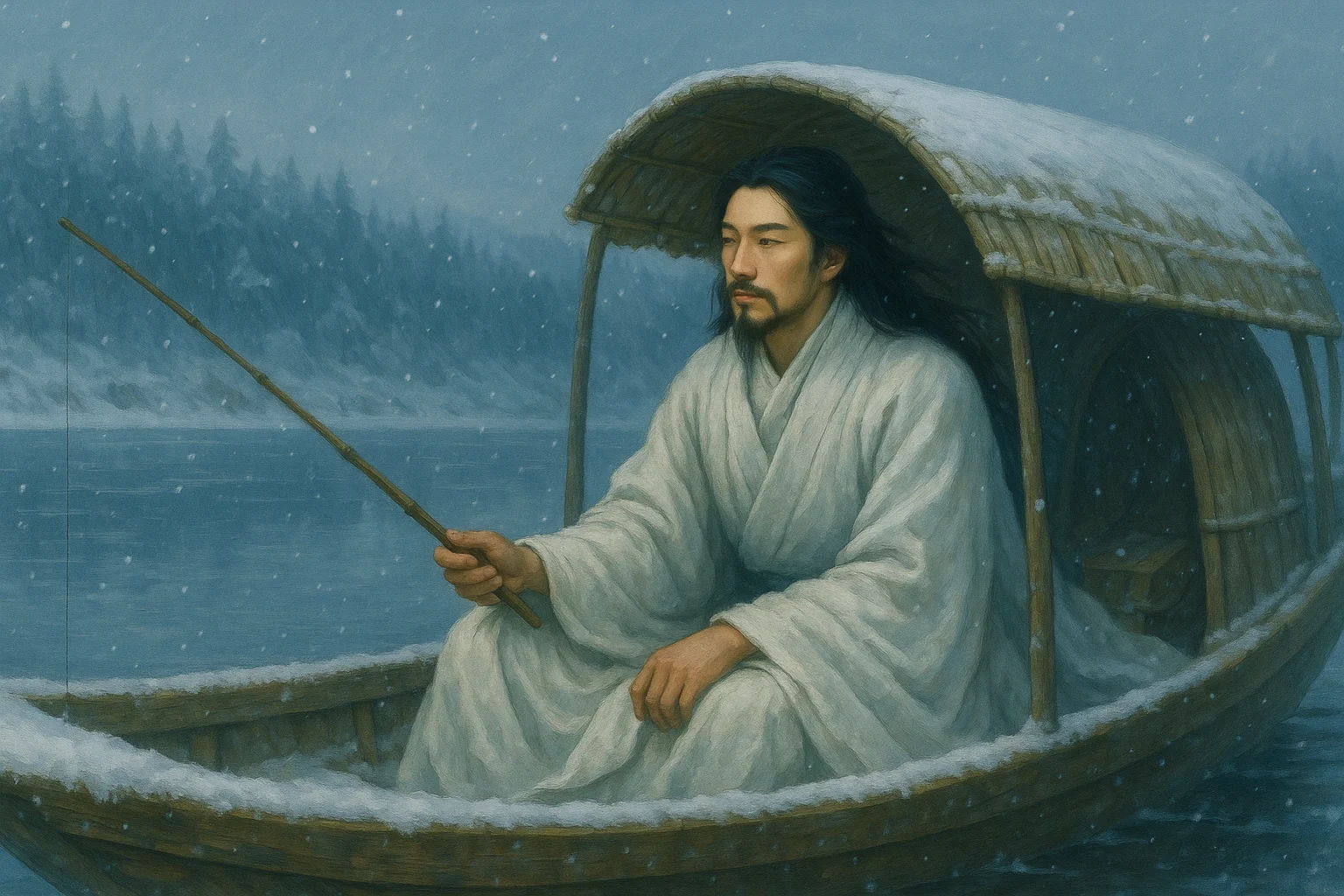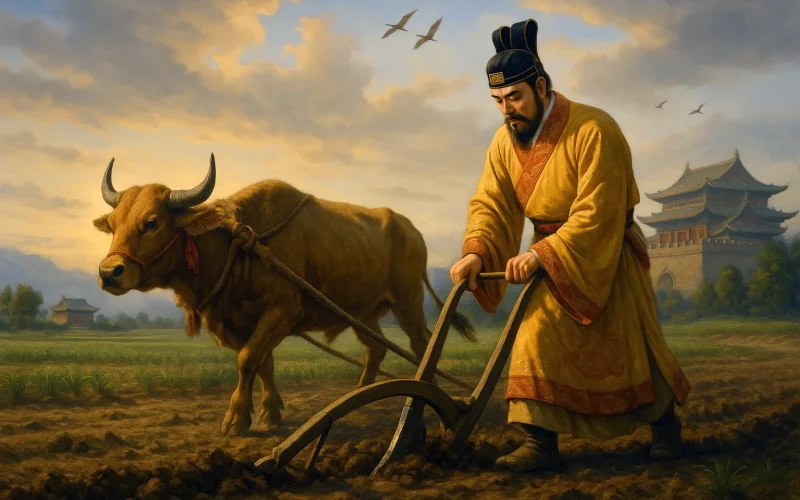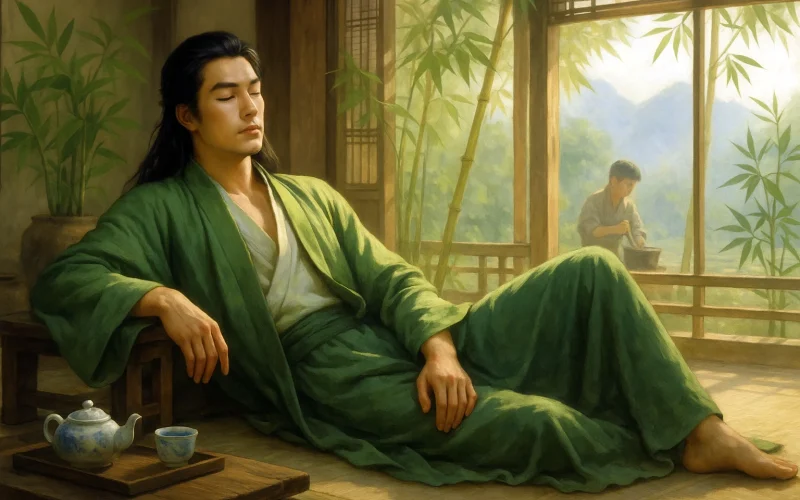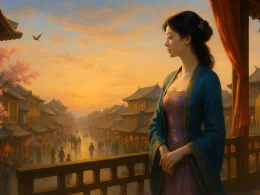The Sacred Field awaits the Emperor's ride,
While I'm stranded in Changsha—years slip by.
No chance to counsel at the Palace side,
Where in the South can my writings fly?
Original Poem
「闻籍田有感」
柳宗元
天田不日降皇舆,留滞长沙岁又除。
宣室无由问釐事,周南何处托成书。
Interpretation
This poem was composed in the winter of the fifth year of the Yuanhe era (810 AD) under Emperor Xianzong of Tang. By this time, Liu Zongyuan had already spent five years in his place of exile, Yongzhou. Demoted from a vice-director in the Ministry of Rites to a minor military official in Yongzhou, he had fallen from a rising star at court to a minister "awaiting punishment." The drastic change in his status and circumstances gnawed at his heart without cease. That winter, the court issued an edict announcing that the Imperial Plowing Ceremony would be held the following spring (the sixth year of Yuanhe, 811 AD). The "Jitian" or Imperial Plowing Ceremony was a ritual where the emperor personally plowed a field, symbolizing the "encouragement of agriculture and emphasis on its fundamentality"; it was an extremely solemn state ceremony. As a former vice-director in the Ministry of Rites, Liu Zongyuan was deeply familiar with such ceremonies and rituals—he should have been the ideal person to participate in the preparations and draft the documents. Yet at this moment, he was in Yongzhou, thousands of li away, and could only learn of this news through government gazettes or letters from friends.
One can imagine the poet's state of mind upon hearing the news. He was not only missing the opportunity to participate in the grand ceremony but, more importantly, was being denied the right to serve his country. Thus, he wrote this short poem, using the historical figures Jia Yi and Sima Tan as analogies for himself, to express the pent-up frustration and helplessness in his heart. The entire poem is only four lines, yet it concentrates the most profound thoughts of home and country, and the sorrows of personal fate, of an exiled scholar-official.
First Couplet: "天田不日降皇舆,留滞长沙岁又除。"
Tiāntián bú rì jiàng huángyú, liúzhì chángshā suì yòu chú.
The Son of Heaven's chariot to the sacred field will soon be going,
But I, detained in this old place, see one more year is almost through.
The first line describes the grand event at court. "Sacred field" refers to the Jitian field, and "the Son of Heaven's chariot" to the imperial carriage. The two words "will soon" indicate the ceremony is imminent, time is pressing. In these seven short words, the busyness and solemnity of Chang'an are fully conveyed—one can imagine the hundred officials at court now busily preparing, the lights of the Ministry of Rites burning bright, documents flying back and forth.
The second line turns abruptly, pulling the focus back to Yongzhou. "Detained in this old place" alludes to the story of Jia Yi, who was once exiled to Changsha; here it refers to the poet himself, similarly detained in the southern wilds. The word "one more" in "one more year is almost through" is the most painful: it is not the first, nor the second, but another year that is about to pass. Every year hope, every year disappointment. This line creates a strong contrast with the grand event of the first line: one is the court's hot activity, the other the poet's cold neglect; one is near, the other far. The contrast is sharp, the tension great.
Second Couplet: "宣室无由问釐事,周南何处托成书。"
Xuān shì wú yóu wèn lí shì, Zhōunán héchù tuō chéng shū.
No summons to the Xuan Room, to ask of holy rite, is sent;
In south Zhounan, to whom can I my life's intended work consign?
This couplet uses two historical allusions in succession, driving the poet's grief and indignation to a deeper level. The first line alludes to the story of Jia Yi in the Xuan Room. After being exiled to Changsha, Jia Yi was eventually recalled by Emperor Wen of Han, who questioned him in the Xuan Room about matters of spirits and gods. Liu Zongyuan inverts this allusion: Jia Yi, though exiled, was eventually recalled and consulted; but what of himself? "No summons"—he has no such opportunity. The "holy rite" refers precisely to sacrificial matters, fitting the imminent Imperial Plowing Ceremony. The poet compares himself to Jia Yi, only to find even deeper despair: Jia Yi was at least remembered, while he himself seems utterly forgotten by the court.
The second line alludes to the story of Sima Tan's regret. Sima Tan, father of Sima Qian, served as Grand Historian and was determined to write a historical work. When Emperor Wu of Han performed the Feng and Shan sacrifices on Mount Tai, Sima Tan, due to illness, was detained in Zhounan (present-day Luoyang) and could not participate in this grand ceremony; it is said he "died of indignation." On his deathbed, holding Sima Qian's hand, he entrusted him to complete his unfinished work. Liu Zongyuan uses this to describe his own situation: like Sima Tan, he is "detained" in the southern wilds, unable to participate in the state ceremony; the ceremonial documents and writings ("my life's intended work") he has labored on also have no one to entrust, nowhere to send. The three words "to whom can I" express the deepest sorrow of a literatus—not only can he not personally participate, but even the words he has painstakingly written find no path for transmission.
Holistic Appreciation
This short poem of only twenty-eight characters uses the most concise brushstrokes to contain the deepest emotions and most precise allusions. The first couplet sets up the opposition between current events and personal fate, hot versus cold, full of tension; the second couplet employs two historical allusions in succession, placing personal misfortune within the long river of history, giving grief and indignation greater depth.
The use of the two allusions is especially masterful. The Jia Yi allusion focuses on the opportunity for "recall and consultation"; the Sima Tan allusion focuses on the qualification to "participate in the grand ceremony" and the transmission of "entrusting one's work." The former is the desire for recognition and employment in life; the latter is the hope for leaving behind writings after death. Through these two allusions, Liu Zongyuan lays bare the double pain of his deprivation—he can neither participate in the present nor entrust anything to the future.
The poem's surface tone is calm, yet every word carries weight. The poet does not cry out loudly, does not weep openly; he merely states facts coolly and employs allusions. Yet it is precisely this restraint that makes the grief and indignation more introverted, and also more powerful. That word "one more" in "one more year," that "no" in "no summons," that "to whom" in "to whom can I"—each is like a heavy hammer striking the reader's heart.
Artistic Merits
- Masterful Use of Allusion, Seamlessly Integrated: The two allusions to Jia Yi and Sima Tan fit both the poet's status as an exile and the theme of the Imperial Plowing Ceremony. The allusions match the person and the event perfectly, with no sense of strain.
- Vivid Contrast, Full of Tension: The imminent grand ceremony in the first line and the detention in the southern wilds in the second form a powerful contrast—hot vs. cold, near vs. far—suddenly deepening the poem's meaning.
- Concise Language, Rich Connotation: Within twenty-eight characters, there is lament for current events, sorrow for the self, echoes of history, and anxiety for the future. The words are simple, the meaning rich, thought-provoking.
- Restrained Emotion, Profound and Forceful: The poet does not express his feelings directly but conveys them through allusions and imagery. The surface is calm, but beneath churn turbulent waves, embodying the typical style of Liu Zongyuan's poetry.
Insights
This poem first prompts us to contemplate the relationship between the individual and the era. The Imperial Plowing Ceremony was a state event, a grand narrative of the times; Liu Zongyuan's "detained in this old place" is the tragedy of an individual fate. When the wheel of the era rolls forward, those thrown from its track can only stand by the roadside and watch from afar. This sense of dislocation between the individual and the era is something anyone living in a time of change might experience. Liu Zongyuan's poem reminds us: history's spotlight illuminates only a few; more people can only watch silently from the shadows.
The word "one more" in "one more year is almost through" also makes us feel the weight of time in waiting. For those who wait, time does not pass evenly; it is the accumulation, year after year, of anxiety and disappointment. Liu Zongyuan spent ten years in Yongzhou; the sentiment of "one more year" he must have felt countless times. This feeling of being worn down by time yet unable to break free from it is the shared experience of the exiled, the banished, all those "detained" by fate. It teaches us: true suffering is often not a sudden blow, but the daily grinding and waiting.
Finally, that sense of isolated desperation in "to whom can I" is especially moving. What Liu Zongyuan sought to entrust was not just his writings, but his ideals, his talent, his loyalty, and the meaning of his life. Yet "to whom can I"—there was no one to receive them, no place to hold them. This nowhere to place one's spirit is the exiles' heaviest pain. It teaches us: a person needs not only a space to exist but also a place for the spirit to rest; not only a settlement in the present but also an echo in the future. When all this is stripped away, writing poetry may be the final place to "entrust one's work."
About the Poet

Liu Zongyuan (柳宗元, 773 - 819), a native of Yuncheng in Shanxi province, was a pioneering advocate of the Classical Prose Movement during China's Tang Dynasty. Awarded the prestigious jinshi degree in 793 during the Zhenyuan era, this distinguished scholar-official revolutionized Chinese literature with his groundbreaking essays. His prose works, remarkable for their incisive vigor and crystalline purity, established the canonical model for landscape travel writing that would influence generations. As a poet, Liu mastered a distinctive style of luminous clarity and solitary grandeur, securing his place among the legendary "Eight Great Masters of Tang-Song Prose" - an honor reflecting his enduring impact on Chinese literary history.












